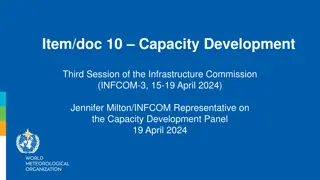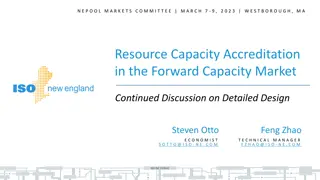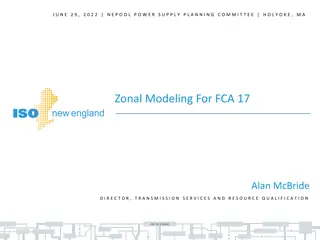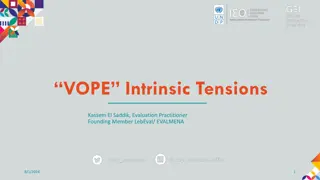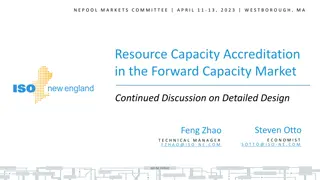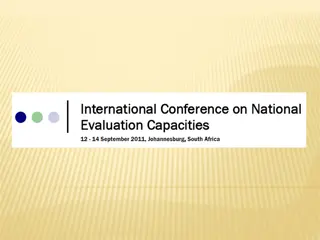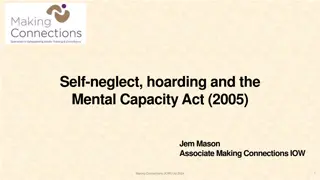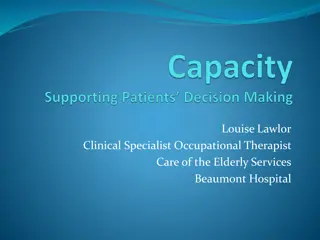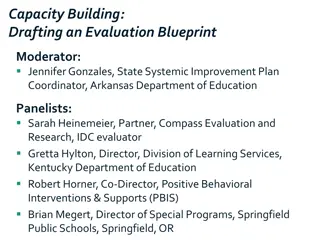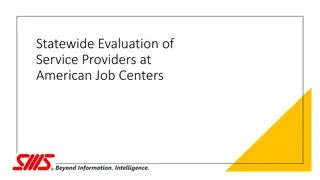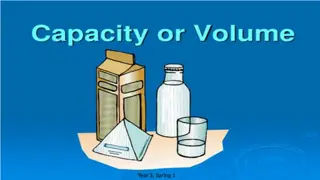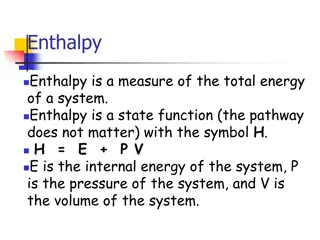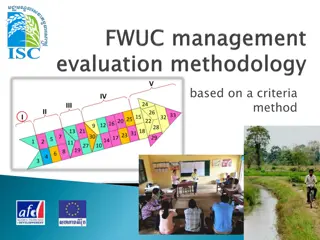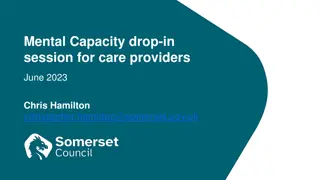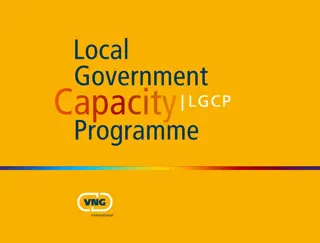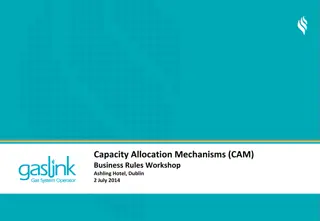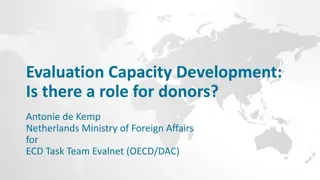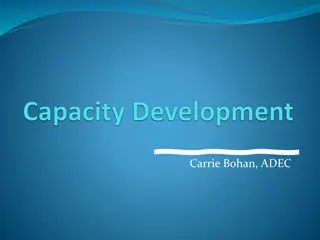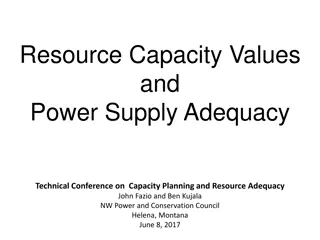Actions Emanating from the Evaluation of the Governance Reform
The evaluation of the governance reform within the WMO aimed to assess its alignment with strategic objectives, effectiveness in responding to societal needs, coordination efficiency, decision-making process, agility, and more. Evaluation criteria included relevance, design validity, effectiveness,
1 views • 13 slides
INFCOM Capacity Development Initiatives Overview
INFCOM's capacity development initiatives focus on enhancing Earth system observations, closing capacity gaps on weather services, and supporting new opportunities in competencies and capabilities. Collaboration and coordination mechanisms have been established to facilitate sharing of information a
0 views • 11 slides
Universal Evaluation Framework: Simplifying Evaluation Processes
This session introduces the Universal Evaluation Framework (UEF) developed for evaluating QAA Scotland Enhancement Themes. Participants learn key evaluation questions, evidence capture, and the Theory of Change to enhance evaluation confidence. The QAA Scotland Evaluation Odyssey details historical
2 views • 14 slides
Implementing Blind Evaluation Pilot in HORIZON EUROPE: Key Facts and Process
HORIZON EUROPE is conducting a pilot on Blind Evaluation in the 2023-2024 work program to address biases in the research and innovation evaluation process. The pilot aims to assess the feasibility of blind evaluations in ensuring fairness and mitigating potential biases towards well-known organizati
9 views • 9 slides
Strengthening National Evaluation Capacity in the Era of Sustainable Development Goals
The presentation by Vijayalakshmi Vadivelu at the National Evaluation Capacities Conference 2017 in Istanbul focused on the importance of strengthening national evaluation capacity in alignment with the Sustainable Development Goals (SDGs). The content covers the holistic approach to national evalua
3 views • 18 slides
Resource Capacity Accreditation in Forward Capacity Market Overview
Resource Capacity Accreditation project aims to enhance ISO-NE's accreditation processes in the Forward Capacity Market, supporting a reliable, clean-energy transition. Key concepts covered in this educational presentation include accreditation space, methods, benefits, challenges, and improvement o
1 views • 53 slides
Resource Capacity Accreditation in the Forward Capacity Market Discussion
The presentation discusses improvements in the Resource Capacity Accreditation project of ISO-NE's Forward Capacity Market to support a reliable, clean-energy transition. It includes details on seasonal components, reconfiguration auctions, trading obligations, and stakeholder schedules. Examples pr
3 views • 71 slides
Capacity Zone Modeling for Forward Capacity Auction 17 Results
This presentation unveils the Capacity Zone modeling calculations for Forward Capacity Auction 17 associated with the 2026-2027 Capacity Commitment Period by ISO-NE PUBLIC. It delves into boundary definitions, import-constrained zone modeling, and market rules guiding the assessments and modeling pr
0 views • 16 slides
Exploring Developmental Evaluation for Better Decision-Making
Delve into the realm of developmental evaluation, focusing on its purpose, principles, and application in practice. Understand how developmental evaluation emphasizes real-time data collection for informed decision-making in complex systems. Learn about key principles such as developmental purpose,
0 views • 25 slides
Enhancing Evaluation Capabilities in Mongolia for Agenda 2030
The Mongolian Evaluation Network in collaboration with UNDP is working to integrate the 2030 Agenda into national strategies and plans, establish institutional coordination mechanisms, align budgets, and enhance data monitoring systems. Key stakeholders including government agencies, NGOs, and inter
0 views • 9 slides
Proposal for Resource Capacity Accreditation in Forward Capacity Market
The ISO-NE has proposed improvements to the accreditation processes in the Forward Capacity Market (FCM) through the Resource Capacity Accreditation (RCA) project. The aim is to enhance the accreditation of resource contributions to ensure reliability during the transition to a cleaner energy mix. T
0 views • 59 slides
Understanding Evaluation in Education
Evaluation in education is a comprehensive term that encompasses measurement, testing, and qualitative examination of student behavior. It involves both quantitative and qualitative descriptions, along with value judgments. Differentiating from mere measurement, evaluation provides a deeper analysis
0 views • 28 slides
Challenges and Resilience of Evaluation Associations: Insights from VOPEs
Despite the growing number of registered VOPEs worldwide, there are significant challenges faced by Evaluation Associations, including tensions between standardization and specificity, balancing diverse interests, and adapting to external pressures. Key observations highlight the need for stronger r
0 views • 6 slides
Resource Capacity Accreditation in the Forward Capacity Market: Continued Discussion and Detailed Design
The Resource Capacity Accreditation (RCA) project by ISO-NE aims to enhance accreditation processes in the Forward Capacity Market (FCM) to support a reliable, clean-energy transition. This presentation focuses on seasonal components of Capacity Supply Obligations (CSO), Pay-for-Performance (PFP) ob
0 views • 58 slides
Strengthening Evaluation Systems for Public Policy Enhancement
Dr. Henry Morales discusses the challenges in public policy evaluation systems, highlighting the need for multi-stakeholder involvement, adapting to local contexts, and enhancing democratic evaluation cultures. The presentation emphasizes the importance of transparency, impartiality, and building na
0 views • 10 slides
Sustainable Evaluation Systems Workshop Summary
Workshop on Sustainable Evaluation Systems by Stephen Porter at the NEC Conference focused on defining evaluation systems, addressing their failures, and emphasizing the importance of quality, use, and networks in achieving sustainability. Participants engaged in activities such as bingo card introd
0 views • 38 slides
Understanding Self-Neglect, Hoarding, and the Mental Capacity Act (2005)
Self-neglect and hoarding are complex issues often intertwined with mental capacity challenges. The Mental Capacity Act (2005) outlines capacity assessments, decision-making criteria, and challenges faced by professionals in safeguarding individuals. Recognizing the need for trauma-informed care in
1 views • 16 slides
Understanding Legal and Mental Capacity in Healthcare Decisions
Clinical specialist occupational therapist, Louise Lawlor, advocates for patients' rights and decision-making capacity in healthcare settings. She emphasizes the importance of legal and mental capacity in making informed decisions, highlighting relevant legislation, guidance documents, and a functio
0 views • 24 slides
Impact and Evaluation Toolkit for Churches and Christian Charities
This toolkit aims to equip churches and Christian charities engaged in small-scale social action projects to think about impact, measure impact, choose data tools, reflect on evaluation data, and use it effectively. It covers principles of evaluation, setting objectives, selecting indicators, storyt
0 views • 34 slides
Overview of Monitoring and Evaluation in the GEF
The Evaluation in the GEF and Training Module focuses on promoting accountability and learning within the Global Environment Facility (GEF) through monitoring and evaluation activities. The GEF Independent Evaluation Office plays a crucial role in assessing results, effectiveness, and performance of
0 views • 25 slides
Enhancing State Capacity for Data Utilization in Education Evaluation
Explore the process of drafting an evaluation blueprint to build state capacity for accurate data collection, reporting, and utilization in education. The discussion covers IDC evaluation approaches, qualitative methodologies, state perspectives on capacity building, and initial feedback. Kentucky's
0 views • 23 slides
Statewide Evaluation of Service Providers at American Job Centers
The Statewide Evaluation of Service Providers at American Job Centers aims to assess the performance and capacity of service providers in delivering career and training services to WIOA Title 1 participants. The evaluation focuses on identifying strengths, weaknesses, and gaps in service provision,
0 views • 31 slides
Exploring Capacity and Volume in Practical Settings
Explore the concepts of volume and capacity through engaging activities involving measuring liquid in containers, understanding units like milliliters and liters, and solving capacity-related questions. Discover how to work out different measurements and practice practical capacity in the kitchen wi
0 views • 7 slides
Understanding Enthalpy and Heat Capacity in Chemistry
Enthalpy is a measure of total energy in a system, represented as H = E + P.V. Heat at constant pressure relates to enthalpy changes. Calorimetry and heat capacity help measure and understand heat in chemical reactions. Specific heat capacity and molar heat capacity play key roles in determining ene
0 views • 16 slides
Workshop on New Approaches to Statistical Capacity Development in Lao PDR
This workshop, hosted by PARIS21 and UNDP, focuses on enhancing statistical capacity development in Lao PDR. It covers topics like successful capacity development programs, partnerships for national statistics development, and prioritizing needs versus international requirements. The Lao Statistics
0 views • 15 slides
Developing an Evaluation Work Plan for Effective Program Assessment
This presentation by Amy D. Andrade from San Jose State University focuses on developing an Evaluation Work Plan to identify responsibilities and timelines. It covers topics such as Evaluation Coaching Support, Webinar Outlines, Logic Model, Inputs-Outputs-Outcomes, Two Approaches to Evaluation, Pro
0 views • 29 slides
Changes in Capacity Allocation Regulations for Gas Infrastructures in Portugal
The new regulation in Portugal brings significant changes in capacity booking and trading to promote convergence with CAM NC and enable a secondary market. Major changes include ex-ante payment of capacity rights, capacity allocation via a booking platform, and enhancement of liquidity in the second
0 views • 13 slides
The Assisted Decision-Making (Capacity) Act 2015 in the Criminal Justice Context
The Assisted Decision-Making (Capacity) Act 2015 introduces key reforms such as the abolition of wards of court system for adults, a statutory functional test of capacity, new guiding principles, a three-tier framework for support, and tools for advance planning. It emphasizes functional assessment
0 views • 17 slides
Evaluation Synthesis in Changing Contexts: Enhancing Knowledge for Development Effectiveness
Evaluation synthesis is crucial for promoting learning, reflection, and decision-making in development work. This process involves bringing together diverse knowledge sources to generate strategic insights and facilitate wider use of evaluation findings. The Independent Office of Evaluation of IFAD
0 views • 20 slides
Understanding Capacity Challenges in Wills: Legal Insights
Testators must possess mental capacity when making a will, as established in legal cases like Banks v. Goodfellow. The common law test for testamentary capacity remains relevant despite the Mental Capacity Act 2005. The Banks v. Goodfellow test outlines the required mental power for making a valid w
0 views • 18 slides
Evaluation of FME Zero Emission Neighbourhoods in Smart Cities
The mid-term evaluation process of FME Zero Emission Neighbourhoods in Smart Cities involves self-evaluation, partner evaluation, and panel evaluation. The procedure includes scientific review, evaluation by scholars, and innovation assessment. Key documents like self-reports, progress reports, and
1 views • 20 slides
Capacity Building and Evaluation Process for Water User Committees
Practical steps are outlined for enhancing the capacity of Water User Committees (WUCs) in their operational tasks through participatory evaluation processes. This involves identifying problems, educating the committee, ensuring adherence to roles, setting improvement priorities, and comparing viewp
0 views • 14 slides
Overview of Regular Evaluation 2017 Findings in Estonia
In the Regular Evaluation 2017, efforts were made to maximize the benefits of evaluation outcomes for various stakeholders in Estonia such as the state, society, and institutions. The evaluation focused on a range of actions including preparing legislation, finding experts, creating self-report form
0 views • 6 slides
Somerset Mental Capacity Training Session June 2023
This information outlines a mental capacity drop-in session for care providers in June 2023, hosted by Chris Hamilton from Somerset Council. It covers topics like the aim of the Mental Capacity Act, the Somerset mental capacity competency framework, and the importance of staff training. It emphasize
0 views • 21 slides
Comprehensive Guide to Training Evaluation Methods
This detailed guide covers the aim of evaluation, evaluation methods, techniques of evaluation, types of evaluation (formative, process, outcome, impact), and the significance of formative and process evaluation in assessing training effectiveness. Learn about the key principles and practices involv
0 views • 45 slides
Capacity Development and Monitoring Methods in LGCP
The agenda includes discussions on the baseline study critique, monitoring methods, and capacity development in the LGCP programme. Emphasis is placed on addressing weaknesses in monitoring and evaluation. Various aspects of capacity development are explored through logical frameworks, indicators, a
0 views • 24 slides
Capacity Allocation Mechanisms (CAM) Business Rules Workshop Summary
This summary provides insights into the Capacity Allocation Mechanisms (CAM) Business Rules Workshop held at Ashling Hotel, Dublin on July 2, 2014. The workshop covered topics such as CAM business rules scope, key features, auction processes, code modifications, implementation timelines, and consult
0 views • 32 slides
Evaluation Capacity Development: Role of Donors in Supporting ECD Initiatives
The presentation discusses the involvement of donors in supporting Evaluation Capacity Development (ECD) initiatives, highlighting areas such as training, conferences, technical assistance, and impact evaluation. It addresses limitations, lessons learned, the importance of networking and partnership
0 views • 11 slides
Understanding Capacity Development in Water Systems
Capacity development is crucial for water systems to acquire and maintain technical, managerial, and financial capabilities in order to consistently provide safe drinking water. Federal requirements mandate new public water systems to demonstrate capacity, with states required to have strategies to
0 views • 8 slides
Resource Capacity Values and Power Supply Adequacy Conference Highlights
Explore insights from the Resource Capacity Values and Power Supply Adequacy Technical Conference, covering topics like integrated vs. standalone capacity values, utilizing hydro storage to increase capacity, and the 2021-22 Adequacy Summary. Learn about the importance of integrated capacity values
0 views • 9 slides

